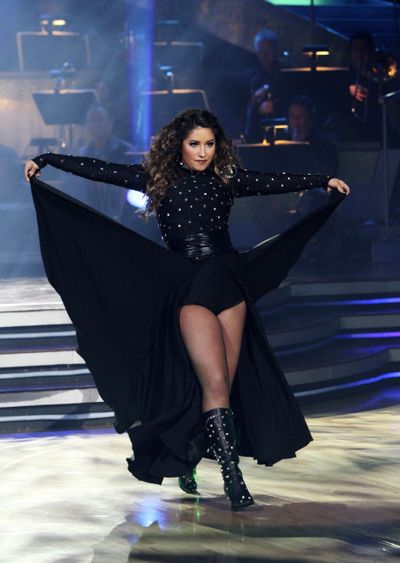ABC reaps rewards of Bristol brouhaha
Palin fans get out the vote; others swear off ‘Dancing with the Stars’

Conservative blogger Kevin DuJan is psyched. He’s actually starting to think Palin can win the whole kit and kaboodle.
No, not Sarah – though he hopes she’ll be the next president. He means daughter Bristol, on “Dancing with the Stars.”
The 20-year-old Palin’s improbable run to this week’s finals – championed by websites like DuJan’s Hillbuzz.org – has led to such an uproar that conspiracy theories are floating, some fans are insisting they’ll never watch again, and a Wisconsin man actually shot up his television.
“There’s been more angst over this than over the 2000 election,” quips media industry analyst Shari Anne Brill, only slightly kidding.
The real winner? ABC, of course. The always-popular “Dancing with the Stars” is enjoying a ratings boost.
For those whose television tastes tend toward shows less awash in sequins, mirrors, feathers and fishnets, a brief recap:
Many were surprised when the shy Bristol, once the country’s best-known teen mom, became a contestant on the hit show, where judges’ scores are combined with public votes to determine the winners.
Paired with professional partner Mark Ballas, she put on her game face and started, well, learning to dance. Her effort was clear; so was her lack of skill and experience.
Flash forward to last week’s results show, with four remaining couples vying for three spots in the finals.
First “Dirty Dancing” star Jennifer Grey was declared safe, then Disney Channel’s Kyle Massey. It came down to Palin and singer Brandy, who had wowed the judges with her sultry tango, earning a perfect score.
When Palin was declared safe, Brandy was speechless, and the jaw of Grey’s partner, Derek Hough, quite literally dropped.
The next morning, “Dancing” fan Kimberly Fishman arrived at her job at a northern California bank. She was furious at the result, and so were co-workers.
“People were saying it’s the tea party voting, that all of Alaska voted,” says Fishman, 42. “It’s all politics.”
Fishman, who identifies herself as a liberal, has resolved not to watch this week.
“I’m done,” she says. “No one could say Bristol is the better dancer.”
And yet, she adds, she herself didn’t vote.
That’s a key point, media analyst Brill says: “A lot of people out there are watching but not voting.”
So who does vote? Obviously, people who really, really care.
Like DuJan, the conservative activist. A former Democrat, he turned into a major Sarah Palin fan after Hillary Rodham Clinton lost the Democratic nomination in 2008.
“Are you planning on hosting a Team Bristol Monday Night Dancing Watch party?” reads a post on his website. “You … can actually vote together and send Bristol over the top … while sending Leftist heads into meltdown.”
In an interview, DuJan said the public support for Palin was a sign of real affection and a desire to reward her after her ordeal under the harsh media spotlight – both as an unmarried pregnant teen, and now with the snide comments about her dancing.
“Think of all the things they’ve said about Bristol,” he said. “This would never be allowed to happen to Chelsea Clinton, or the Gore daughters, or God forbid the Obama daughters. Support for her is real.”
Besides, he said, “I think she’s a marvelous dancer. She’s the only one whose performances have improved every single week.”
DuJan defends a tactic that has gotten some critics angry: The use of fake e-mail addresses and multiple phone numbers to let people exceed their vote limit.
People can vote by phone, text or online, with the first two methods possible for 30 minutes after the show and online voting until 11 a.m. the next day.
At this point in the season, there’s a limit of five votes per phone number and e-mail address. While people must register their e-mail address with ABC.com, if one uses fake addresses, the possibilities are endless.
Which is great, says DuJan, who has sat for hours into the night, voting.
“If people want to have pajama-jammy-jams all night, having pillow fights and roasting marshmallows and voting, then why not?” he says.
“Isn’t the winner supposed to be the one who has the most passion behind them? Well, this is passion.”
On his website, DuJan recently put it this way: “Start calling the moment the show starts … After that, use someone else’s phone to call the maximum times. Then … randomly knock on neighbors’ doors and use their phones to call, call, call, and then call some more.”
In an interview, “Dancing” executive producer Conrad Green acknowledged that using fake e-mails was possible, but he said security checks are in place to detect abnormal activity.
Still, he doubted many people were doing it – and anyway, fans of any dancer could do the same.
Television analyst Steve Sternberg says people shouldn’t be so surprised.
“If you only want the most talented and best to be picked, don’t allow the general public to vote,” Sternberg says. “I think this controversy is actually helping ratings.”
Indeed. According to ABC, “Dancing,” now in its 11th season, is up substantially over last year, drawing an additional 3.3 million viewers.